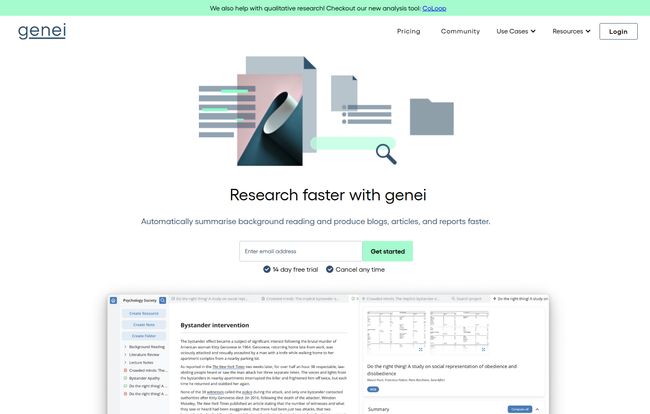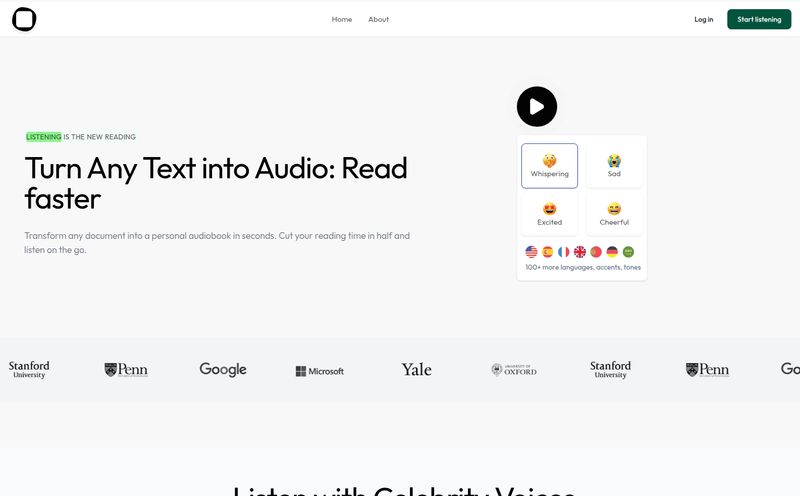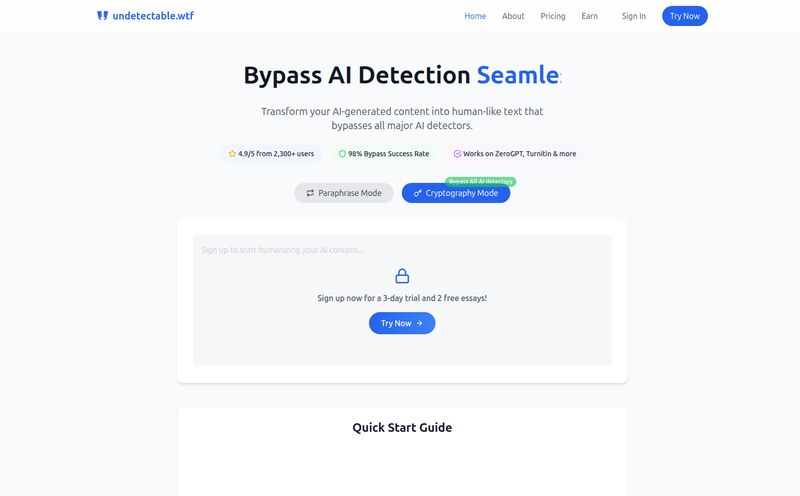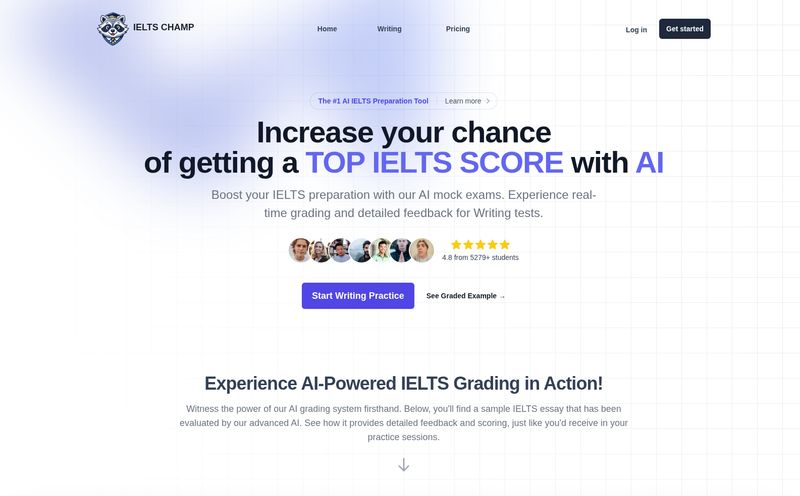As someone who lives and breathes SEO and content, my browser is a perpetual war zone of open tabs. We’re talking research papers, competitor blogs, source articles, data reports… it’s a mess. I’ve always joked that 70% of my job is just reading, and the other 30% is complaining about how much reading there is to do. So when another AI tool pops up promising to “revolutionize” my workflow, my first reaction is usually a healthy eye-roll. We've seen so many of them, right?
But then I heard some chatter about genei. It wasn't just another AI writer; it was being positioned as a research accelerator. It had backing from Y Combinator and was getting nods from places like TechCrunch and Oxford University. My curiosity got the better of me. Could this finally be the tool that tames the information beast? Or was it just another shiny object? I had to find out.
So, What's the Big Deal with genei?
Before we get into the nitty-gritty, let's clear up what genei is—and what it isn't. It is not going to write your blog post or academic paper for you. Thank goodness. Instead, think of it as a super-powered research assistant. The kind you wish you had in college. You hand it a mountain of PDFs and a list of web pages, and it instantly reads through them, pulls out the most important information, identifies key themes, and neatly organizes everything for you.
It’s designed to slash that background reading time so you can get to the important part—thinking, analyzing, and creating—much, much faster. For a content strategist like me, that’s gold. For a student staring down a dissertation, it might just be a lifesaver.

Visit genei
Putting genei Through Its Paces: A Real-World Test
Talk is cheap, so I threw genei right into the deep end. I was working on a comprehensive guide about the future of programmatic advertising. This meant I had about 15 different sources: a few dense industry whitepapers, several long-form articles from marketing journals and a handful of competitor posts I wanted to analyze. Normally, this would be a two-coffee, multi-day process of reading, highlighting, and copying notes into a sprawling Google Doc.
I uploaded everything into a genei project folder. The first thing I noticed was the 'AI-powered overview.' Almost instantly, it generated a summary of the entire project folder, identifying the core themes running through all my documents. It was surprisingly coherent. It correctly picked up on the debates around privacy, the cookieless future, and the rise of retail media networks. Pretty cool.
Then I started digging into individual documents. The AI summarization is clean and the keyword extraction was genuinely useful for identifying semantic terms I might want to target. It wasn't just pulling out the obvious stuff; it was finding concepts. This is where I started to think, okay, there's something to this.
The Standout Features (And a Few Quirks)
After playing around for a week, a few features really became central to my workflow.
AI Summarization & The Power of GPT-3
genei offers a couple of tiers of AI quality. The basic summarization is good for getting the general gist of an article. But the Pro plan, which uses GPT-3, is where things get really interesting. The summaries are more nuanced, and you gain access to rephrasing and paraphrasing tools. I found myself using this to quickly distill complex paragraphs from academic papers into a more digestible format for my notes. It’s not about plagiarizing; it’s about translating dense academic-speak into plain English so your brain can process it faster.
Multi-Document Analysis is the Secret Weapon
This, for me, is the killer feature and the main reason to go Pro. You know that feeling when you have 20 tabs open and you're trying to find that one statistic you know you saw somewhere? This is the cure. Within my programmatic advertising project, I could just ask the AI a direct question: “What are the top three challenges in implementing retail media networks?”
And genei didn’t just search for keywords. It went through all 15 documents and synthesized answers, complete with citations pointing back to the exact source document and page. This is an absolute game-changer. It turns a folder of PDFs from a static library into a dynamic, searchable database you can have a conversation with. Seriously powerful stuff.
Notes, Citations, and Sweet, Sweet Organization
I also came to appreciate the less flashy features. The notepad is built right into the workspace, and you can link your notes directly to specific passages in the source documents. Plus, it has an in-built reference generator. As a blogger who always cites sources, this saves a ton of tedious busywork. For an academic, this feature alone could justify the cost by preventing the headache of manually managing citations in tools like EndNote or Zotero. It keeps your research and your writing in one coherent space.
Okay, It’s Not Perfect. Let's Be Real.
As much as I like it, genei isn't flawless. My biggest gripe is that the Basic plan feels more like a demo than a fully-fledged tool. The most powerful features—the multi-document analysis, the high-quality AI, the GPT-3 functions—are all locked away in the Pro plan. I get it, you have to monetize, but it does make the entry-level tier feel a little... limited.
I also ran into a few minor bugs, like a form that errored out when I tried to submit it. Nothing that a quick refresh couldn't fix, but it's a small reminder that this is still a growing platform. It’s not a dealbreaker by any means, but it lacks some of teh polish of more established software suites. Just something to be aware of.
How Much Does This Magic Cost? The Pricing Breakdown
This is where things get interesting, because genei has a smart pricing structure that really shows they know their audience. They split it between Professional and Academic users, with academics getting a very generous discount.
For students and academics, you're looking at around £3.99 per month for the Basic plan, which covers summarizing single documents, managing files, and generating citations. The all-powerful Pro plan is £15.99 per month, which unlocks the multi-document analysis and GPT-3 features. Frankly, for a PhD student, that's a steal.
For professionals like me (writers, marketers, analysts), the price is a bit higher. The Basic plan is £9.99 per month, and the Pro plan is £29.99 per month. Is it worth thirty quid? If you're a content creator who needs to research multiple topics a month, or a strategist who needs to synthesize market data, the time it saves could easily justify the cost.
So, Who is genei Actually For?
After my deep dive, I have a pretty clear picture of who gets the most out of genei.
- Students and Academics: This is a no-brainer. The ability to process vast amounts of reading material and manage citations is invaluable. The academic pricing makes it incredibly accessible.
- Content Marketers and SEOs: Absolutely. It dramatically speeds up the research phase for creating pillar pages, white papers, and in-depth articles. Using the Q&A feature across competitor articles is a brilliant way to do content gap analysis.
- Qualitative Researchers: The tool is clearly built with deep research in mind. Its ability to find themes across multiple documents makes it a strong ally for anyone working with interview transcripts, reports or qualitative data.
The Final Verdict: Is genei Worth a Spot in Your Toolbox?
So, here's my final take. Yes, genei is worth it—with a big caveat. If your work involves wrestling with large volumes of text on a regular basis, it's one of the best productivity tools I've come across in a long time. It doesn't do the thinking for you, which I actually see as a plus. It's not a crutch, it's a force multiplier.
I like to think of it like this: Research is like hacking through a dense jungle with a machete to find a hidden temple of insight. Genei doesn't find the temple for you, but it hands you a powered-up, laser-guided machete. You still have to do the work of exploring and interpreting what you find, but all the tedious, time-sucking undergrowth has been cleared for you.
If you're a professional writer, a serious student, or anyone who feels like they're drowning in a sea of information, I'd strongly suggest giving the 14-day free trial a spin. You might just find the research assistant you've been waiting for.
Frequently Asked Questions about genei
- Can genei write my essay or article for me?
- No, and that's a good thing! Genei is a research and summarization tool designed to help you understand information faster and organize your findings. The actual writing and critical thinking are still up to you.
- How accurate is the AI summarization?
- It's surprisingly good, especially on the Pro plan with GPT-3. It excels at capturing the main arguments and key points of a document. However, for critical details or exact quotes, you should always refer back to the original source text.
- What is the main difference between the Basic and Pro plans?
- The Pro plan is where the real power lies. It adds multi-document analysis (asking questions across an entire folder), higher-quality AI summaries, and GPT-3 powered features like rephrasing and paraphrasing. The Basic plan is best for working with one document at a time.
- Is there a free trial for genei?
- Yes, genei offers a 14-day free trial for its Pro plan, so you can test out all the premium features before deciding if it's right for you.
- Can I use genei with any document?
- Genei works with both PDFs and web pages. You can upload files directly from your computer or add webpages via a URL, and it will process them into your workspace.



